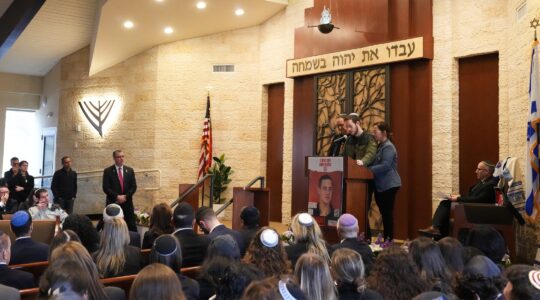LOS ANGELES, July 31 (JTA) — “In many ways it was a good world, in many ways it was a hard world,” narrator Elliott Gould observes in introducing “A Yiddish World Remembered.” It’s not easy to evoke a lost era through television footage, but “Yiddish World” largely overcomes the difficulty. The one-hour PBS special, which premieres Aug. 14, presents lively interviews with six elderly men and women who remember the shtetls from their childhoods, vintage photos and some newly discovered archival films, including one showing the bloody aftermath of a 1919 pogrom. The picture of shtetl and city life in the Eastern European Pale painted by these survivors tends to be more “good” than “hard,” shading into the sentimental in the vignettes of childhood life recalled many decades later. The smells and savor of mama’s heavenly cholent, chicken soup, gefilte fish, or even herring and potatoes all but leap off the screen in the ecstatic reminiscences. “Rockefeller wasn’t as happy as I was on Friday nights when we made kiddush,” recalls one former shtetl child. The vibrant cultural life of the time and place is perhaps familiar, as are the political and religious rivalries among Chasidim, Bundists and Zionists. Still, it gives one pause to learn that there were no less than 24 competing Yiddish dailies in Poland at the turn of the century. In the end, it is the language itself that binds together all other aspects of this lost world. “Yiddish is the soul of the Jewish people, it speaks by itself,” says one old-time immigrant to America. “Sometimes I want to talk in English, but it comes out Yiddish. Even if you don’t know the language — you feel it.”

Help ensure Jewish news remains accessible to all. Your donation to the Jewish Telegraphic Agency powers the trusted journalism that has connected Jewish communities worldwide for more than 100 years. With your help, JTA can continue to deliver vital news and insights. Donate today.





